How the Children's Laureate championed young literature
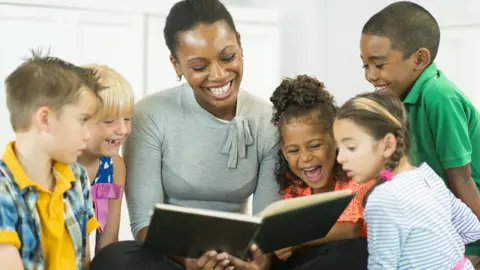 Google
GoogleNetflix, Spotify, iPads, YouTube and Instagram are just a few things that didn't exist when the Children's Laureate was set up 20 years ago.
In 1999, the main obstacle in getting children interested in reading was their own attention spans.
The printed page may now have far more competition than it used to, but author Michael Morpurgo, who set up the Children's Laureate, says technology has in some ways been "enormously beneficial".
"Children are now using the written word a great deal, they are emailing and they are texting," he tells BBC News. "And so the written word is more familiar to them to express themselves.
"It may be just in a few digits. But nonetheless, they're doing that, not because it's an exercise at school, they're just getting very used to using words.
"However, we have a major, major problem in the millions of our children who don't become readers. And we haven't conquered that."
That's just one of the factors that led Morpurgo to set up the Children's Laureate in the first place two decades ago.
He, in collaboration with the late poet Ted Hughes, came up with the idea of having authors publicly champion children's literature for a tenure of two years each.

Who are the previous Children's Laureates?
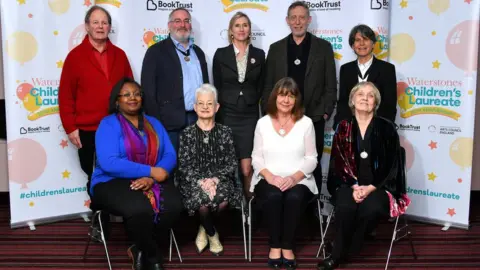 Getty Images
Getty Images- Quentin Blake (1999-2001)
- Anne Fine (2001-2003)
- Michael Morpurgo (2003-2005)
- Jacqueline Wilson (2005-2007)
- Michael Rosen (2007-2009)
- Anthony Browne (2009-2011)
- Julia Donaldson (2011-2013)
- Malorie Blackman (2013-2015)
- Chris Riddell (2015-2017)
- Lauren Child (2017-2019)

The aim of the job is to "promote and encourage children's interest in books, reading and writing" and comes with a bursary of £15,000 (and a shiny, silver medal).
The role, which celebrates its 20th birthday on Friday, involves everything from giving speeches and visiting schools to writing articles and promoting children's literature in interviews.
While technology may have transformed the lifestyles of children in the 20 years since the role was created, several of the Laureates agree with Morpurgo that it hasn't posed a significant threat to reading.
"Perhaps children might like to read an e-book or listen to a podcast - but I don't think anything beats an actual physical book," says Jacqueline Wilson.
Anne Fine adds: "Once a child's become a passionate reader - and that usually stems from early sharing of books of any sort with parents - they'll read anything in any format.
"But," she cautions, "many parents who tell themselves their child is reading an e-book are fooling themselves. As often as not, they've secretly moved on to some addictive onscreen game."
For Morpurgo, the platform is irrelevant. "I don't care where and how they access their stories, it doesn't matter to me," he says.
"Whether you're reading on Kindle, whether you're reading online, whether you're reading a book, the extraordinary thing is this access that a child has to ideas through words."
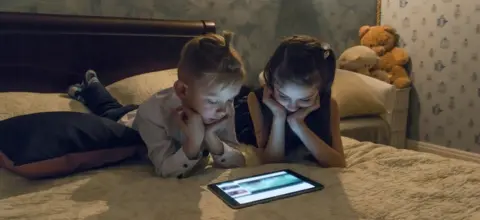 Getty Images
Getty ImagesEach of the Laureates has had a slightly different approach to their own tenure.
One of Wilson's aims was to "get everyone to read aloud to children, all children, from the age of nought to 11".
Chris Riddell spent much of his two years defending school libraries and librarians - something Morpurgo also feels passionately about - and promoting the art of illustration at live events.
"I travelled up and down the country, visiting schools from Aberdeen to Cornwall and I was thrilled to visit Northern Ireland for the first time," Malorie Blackman wrote in a BookTrust article about her time in the role.
"I spoke to over 30,000 teens at schools and festivals nationwide about writing, books and reading for pleasure. I was a spokesperson promoting reading for pleasure, especially for our teens who may fall out of the reading for pleasure habit due to exam and school pressures."
During his two years, Quentin Blake produced a book called A Sailing Boat in the Sky in collaboration with 1,800 French-speaking schoolchildren.
"Each of the Children's Laureates, in his or her own way, has raised the level of interest in and enthusiasm for children's books," Morpurgo says.
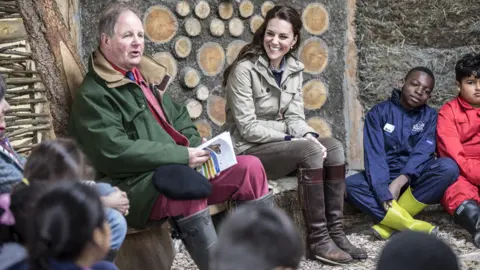 Getty Images
Getty ImagesHis initial reason for setting it up was to try to ensure writing for children got the attention and credit it deserved.
"I was aware that, by and large, the world out there wasn't that interested in writing for children or in books for children," he explains.
"You must remember, this was pre-Harry Potter, and pre-Philip Pullman and many of our great authors of today.
"Serious literature had to be for people who were called adults, and then there were these books called children's books, which were at the back of a bookshop, and belittled to some extent."
Things have changed remarkably since then.
Authors such as JK Rowling and David Walliams have turned children's books into huge bestsellers.
Meanwhile schemes like BBC Radio 2's 500 Words and CBeebies Bedtime Stories, aimed at getting children reading and writing from a young age, have become hugely popular.
"Reading enables children to grow emotionally," Morpurgo says. "In all sorts of ways - imaginatively, in terms of self-confidence, it helps them to explore the world beyond the one they lived in.
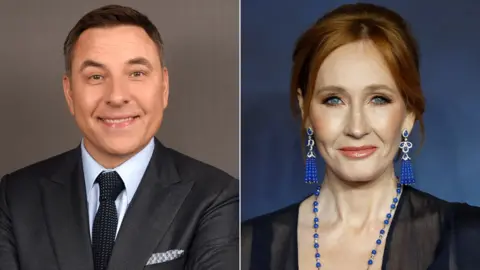 Getty Images
Getty Images"Particularly for children who do not have very contented lives or contented homes, it enables them to have a private, imaginative journey into literature, which would enrich their lives."
The next Children's Laureate - not yet announced - will take over from Lauren Child this year.
So what is the best way to help children develop an interest in books?
"Read to them - and read yourself," says Fine. "Children are poor at taking good advice, but excellent at following a bad example."
Wilson advises: "Start by reading aloud to them and then to find that really special book that will turn them into a bookworm for life."

Follow us on Facebook, on Twitter @BBCNewsEnts, or on Instagram at bbcnewsents. If you have a story suggestion email [email protected].
